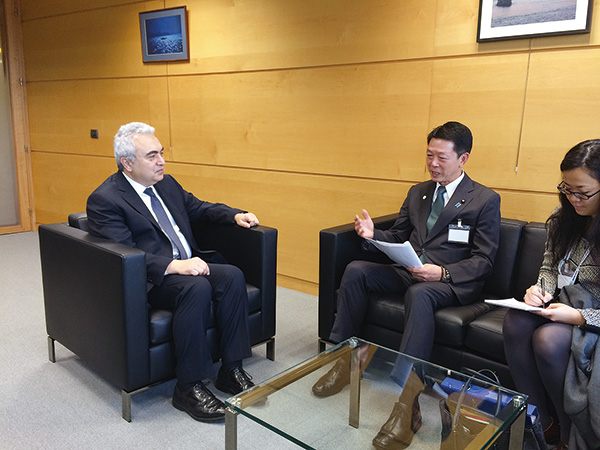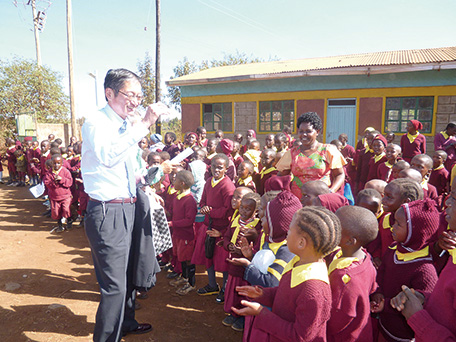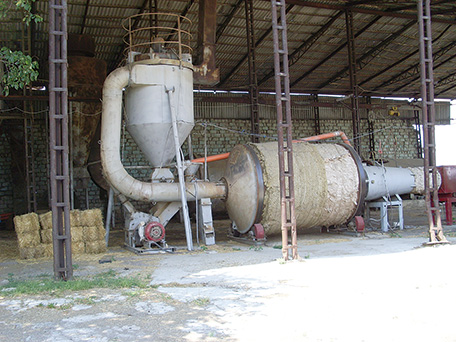(5) Securing Access to Resources and Energy
The number of people who have no access to electricity in the world is estimated at around 1.3 billion (equivalent to 18% of the world’s population). In particular, this number is estimated to reach two-thirds of the population (approximately 620 million people) in Sub-Saharan Africa. Meanwhile, in Sub-Saharan Africa, nearly four-fifths of the population (approximately 730 million people) rely on fuelwood (e.g., charcoal, firewood) for cooking, which causes indoor air pollution and is a leading cause of death among young people.(Note 27) The lack of electricity, gas and other energy services leads to the delay in industrial development, a loss of employment opportunities, a further increase in poverty, and restricted access to medical services and education. Going forward, global energy demand is expected to increase further, mainly in Asian countries as well as other emerging and developing countries. Thus, a consistent energy supply and appropriate consideration to the environment are essential.
< Japan’s Efforts >
In order to realize sustainable development and secure energy in developing countries, Japan works on the provision of services, which enables modern energy supply, and the stable supply of power for industrial development. In addition, Japan provides support for the establishment of an environmentally-friendly infrastructure, such as construction of energy-saving equipment and power generation facilities that utilize renewable energy (hydropower, solar power, wind power, geothermal power, etc.).
At the G7 Elmau Summit held in Germany in June 2015, the Initiative for Renewable Energy in Africa, aimed at improving energy access in Africa, was announced as part of the annex to the Leaders’ Declaration.

State Minister for Foreign Affairs Yoji Muto meets with International Energy Agency (IEA) Executive Director Fatih Birol in November 2015.
Meanwhile, Japan provides resource-rich countries with support according to their needs, such as establishing infrastructure in the mine area, aiming to enable them to acquire foreign currency through the development of their resources and to develop in a self-sustained way. Through these supports, Japan will enhance mutually beneficial relationships with developing countries with rich resources, while striving to ensure the stable supply of energy and mineral resources, by promoting the development of resources, production, and transportation by private companies. It is important to proactively use Japan’s ODA in the resource and energy sectors alongside support from the Japan Bank for International Cooperation (JBIC), Nippon Export and Investment Insurance (NEXI) and Japan Oil, Gas and Metals National Corporation (JOGMEC). Additionally, at the G7 Brussels Summit held in June 2014, a new initiative on Strengthening Assistance for Complex Contract Negotiations (CONNEX) was launched, aiming at improving the capacity of developing countries to negotiate contracts on natural resources.
Japan also proactively supports the Extractive Industries Transparency Initiative (EITI). EITI is a multinational cooperative framework to increase the transparency of the flow of money in development of oil, gas, mineral and other resources. Under this framework, extracting corporations report the amount of payment to the governments of resource-producing countries and the governments report the amount of received money. Thus, the flow of money increases the transparency. Participants in EITI include 48 resource-producing countries, many supporting countries including Japan, extractive companies and NGOs. EITI participants are working together to prevent corruption and conflict, as well as to encourage responsible resource development that leads to growth and poverty reduction.
- Note 27: Sources: IEA, “World Energy Outlook 2014” (estimates as of 2012) IEA, “Africa Energy Outlook 2014”
Kenya
The Project for the Installation of Solar Electric Facilities for Improvement of Life Standard in Nkama Area
Grant Assistance for Grassroots Human Security Projects - Public-Private Partnership
(March 2014 – November 2014)

Ambassador of Japan to Kenya Tatsushi Terada is welcomed by pupils of South Mount Nkama Academy. (Photo: Embassy of Japan in Kenya)
Kenya has enhanced its power distribution network in recent years. By expanding this network, Kenya is now able to also power households that were once off the grid. However, many households still have not joined the grid, even in areas where new distribution lines have been laid. This is because joining the grid is very expensive, while the electricity supply is unstable. These households use kerosene lamps for lighting. However, these lamps have caused serious eye and respiratory issues in children who study at home at night.
As part of its ODA, the Government of Japan also conducts public-private partnership projects. Japan receives proposals from Japanese NGOs or private sector companies, and together they provide support to developing countries.
The Project for the Installation of Solar Electric Facilities for Improvement of Life Standard in Nkama Area was one such public-private partnership project in Kenya. The project was proposed by Kyocera Corporation, a Japanese company, as part of its Corporate Social Responsibility (CSR) activities and Base of Pyramid (BOP) business. Kyocera and the Government of Japan are working together to introduce solar power systems in Nkama Area, to improve standards of education and living among local residents.
Kenya is an ideal place to generate solar power because it is located along the equator and receives intense sunlight. A solar power system was installed at the local elementary school in Nkama Area and will be able to operate for more than 20 years. This will provide the school with a stable source of energy for many years to come. In addition, small solar lamps for night-time use have been distributed to children who study at home. These lamps can also be used to recharge mobile phones, which has helped to improve the lives of local residents.
This public-private partnership for solar power in Nkama Area has produced results. It is hoped that the initiative can be expanded throughout Kenya and other neighboring African countries, and produce similar results. This will help to significantly improve peoples’ living conditions and children’s learning environments. (As of August 2015)
Moldova
The Project for Effective Use of Biomass Fuel
Grant Aid for Environment and Climate Change (June 2013 – Ongoing)

Pellet manufacturing equipment. Material drying equipment. (Photo: JICA)
Moldova lacks mineral resources and imports almost all of its energy resources, including natural gas and coal, from Russia, Ukraine and other neighboring countries. Moldova was able to import fuel from the former Soviet Union at a low price when it was a part of it. However, Moldova has had to purchase fuel at international market prices since its independence. This has placed pressure on Moldova’s national finances. Moldova’s local governments also face financial difficulties and have been unable to purchase sufficient quantities of fuel to keep warm during the harsh winter. As a result, community schools and other public facilities in these regions cannot receive sufficient heating, and sometimes schools are closed temporarily during the winter. Thus, Moldova needs to take measures to secure a stable supply of heat.
At the request of the Government of Moldova, the Government of Japan concluded an agreement in 2013 to implement the Project for Effective Use of Biomass Fuel. This is funded by Grant Aid for Environment and Climate Change up to a maximum of ¥1.154 billion.
This project seeks to introduce a system for manufacturing fuel pellets from straw, wheat stalks and fruit tree branches in Moldova. These pellets are used in highly efficient biomass boilers that are installed in schools and other public facilities.
This project is being implemented as part of Japan’s assistance to developing countries for climate change measures since 2013. It also aims to support the international contribution of Japanese SMEs and other companies that possess excellent technologies. This is done by promoting the utilization of Japanese technologies and products, such as pellet manufacturing machines and boilers.
Japan’s assistance will help Moldova introduce new heating systems at public facilities and reduce the cost of fuel they consume. As a result, Moldova is also expected to lower its carbon dioxide emissions. Furthermore, Moldova will also be able to improve its energy security, once these fuel pellets become a widely-used alternative fuel source.
Japan will continue to work closely with Moldova to establish fair and effective international mechanism, which includes all countries, in the field of climate change. (As of August 2015)
